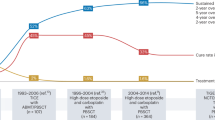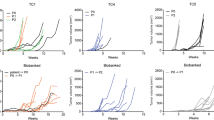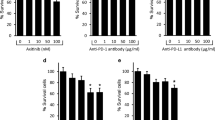Abstract
Ifosfamide is clinically used in combination chemotherapy regimens for the treatment of patients with high-grade lymphomas, sarcomas and metastatic germ cell tumours. In order to reduce the oxazophosphorine-related urothelial toxicity, sodium mercaptoethane sulphonate (mesna) is used in different schedules following the administration of ifosfamide. The proposed mechanism of mesna activity is the binding of toxic oxazaphosphorine metabolites such as acrolein in the urine of the patients. Since an influence of mesna on ifosfamide anti-tumour activity is controversial, the current study has used xenografts from two human testicular cancer cell lines heterotransplanted into nude mice to study the anti-tumour activity of ifosfamide in combination with different dosages and schedules of mesna. In both human testicular cancer cell lines, H 12.1 and 2102 EP, ifosfamide demonstrated anti-tumour activity as a single agent. No reduction in ifosfamide activity was observed with the application of mesna at a dose range from 50% to 200% of the ifosfamide dose. Furthermore, the application of mesna before and 3 h after ifosfamide, a schedule used in many clinical protocols because of the short half life of mesna, not only maintained high ifosfamide anti-tumour activity but also seemed to be associated with the lower systemic and urothelial toxicity of ifosfamide therapy compared with ifosfamide given alone. In conclusion, the experimental in vivo system using human heterotransplanted testicular cancer cell lines confirms the significant anti-tumour activity of ifosfamide in malignant germ cell tumours and demonstrates that mesna does not impair ifosfamide anti-tumour activity in this model. These results are most likely transferable to the use of mesna in patients with metastatic testicular cancer.
This is a preview of subscription content, access via your institution
Access options
Subscribe to this journal
Receive 24 print issues and online access
$259.00 per year
only $10.79 per issue
Buy this article
- Purchase on Springer Link
- Instant access to full article PDF
Prices may be subject to local taxes which are calculated during checkout
Similar content being viewed by others
Author information
Authors and Affiliations
Rights and permissions
About this article
Cite this article
Bokemeyer, C., Schmoll, HJ., Ludwig, E. et al. The anti-tumour activity of ifosfamide on heterotransplanted testicular cancer cell lines remains unaltered by the uroprotector mesna. Br J Cancer 69, 863–867 (1994). https://doi.org/10.1038/bjc.1994.167
Issue Date:
DOI: https://doi.org/10.1038/bjc.1994.167
This article is cited by
-
In Vivo Antitumor Activity of a Novel Orally Bioavailable Ifosfamide Nanostructured Lipid Carrier Against Dalton’s Ascitic Lymphoma
Journal of Pharmaceutical Innovation (2014)



